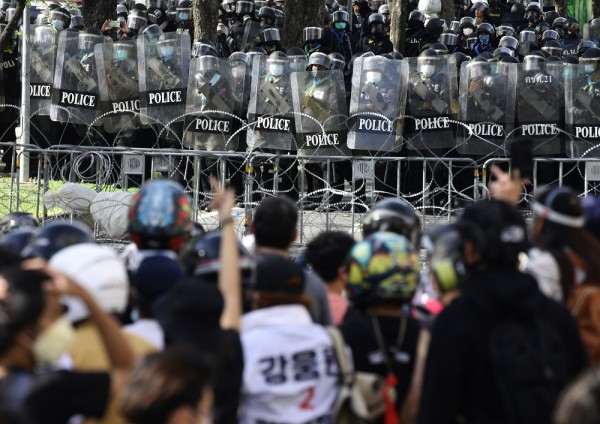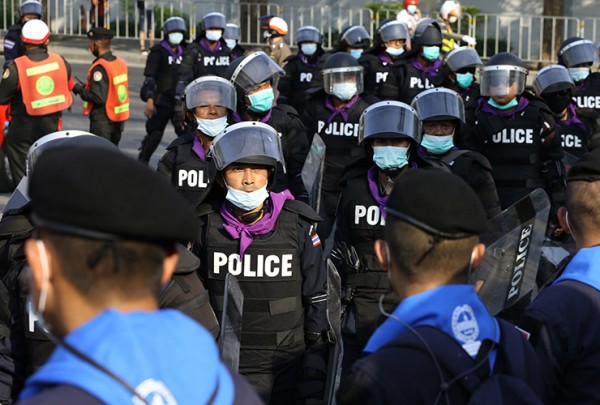An Italian photojournalist is reportedly among at least five people killed on Wednesday in Bangkok. The Thai capital has seen widespread rioting in the aftermath of a crackdown by government security forces which led to the surrender of at least four rebel commanders earlier today.
“We do not know who killed him”, said Tulsathit Taptim, editor of Thailand’s Nation newspaper. “It could have been government forces, or the act of a sniper.”
The journalist has been identified by the media as 45-year-old Fabio Polenghi, a freelance photojournalist.
At least three other journalists are reported to have been wounded by gunfire in Bangkok on Wednesday. A Dutch journalist, Michel Maas, who reported for Netherlands Radio Worldwide (NWR) and Volkskrant newspaper – also based in the Netherlands – was shot in the shoulder during the chaos that surrounded the assault on Red Shirt barricades by the Thai army, Leen Verraeke, an editor at Volkskrant told IPI by phone. An American documentary filmmaker was treated for a gunshot wound in his leg.
Verraeke said she had she spoken to Maas at about 14:00 CET. She said he was in a hospital in the centre of Bangkok, at the heart of the violence. The bullet, she noted, was still in his shoulder although the need to remove it is not “urgent”. She added: “The situation in the hospital is chaotic. They had to evacuate to other rooms because of a shopping mall was burning nearby.”
Maas was with the Red Shirt protestors when the army began its assault. Verraeke said that he felt that the biggest danger now was the army, “because they shoot everything that’s moving and don’t ask if you are a reporter before shooting.”
She said “Michel started running away from the army when everyone else started running away.”
According to Verraeke, Maas “believes he was shot by an army bullet.”
Thailand’s The Nation reported that a journalist was among four people wounded in an M79 grenade attack.
On Sunday, 16 May, a reporter with the Phuket Gazette, Chaiwat Phumpuang, was shot in the leg while covering the demonstrations.
Meanwhile, the government has imposed a partial media blackout on local TV stations, saying all of them will have to air government-prepared bulletins.
“They might be able to show their regular news programs. But we are concerned about their live broadcasts from the scenes,” Centre for Resolution of Emergency Situation (CRES) spokesperson Panitan Wattanayagorn told reporters. “There will be more (government) programs … to be shown simultaneously by all stations.”
The CRES has also ordered the Ministry of Information and Communications Technology to shut down at least 190 websites, Prachatai.com reported today. The websites are mostly believed to be supportive of the Red Shirt protesters.
In another development, protesters reportedly besieged the offices of Channel 3, a TV station whose staff had been surrounded and harassed on Friday, 14 May, by protesters who accused them of being biased against the protesters in their reporting. Reports from the Nation newspaper suggested that a fire had broken out in the offices of Channel 3, and the station has stopped broadcasting.
“Many TV station staff have been surrounded” said Taptim. “We did not expect Channel 3 to be the first one attacked. It is possible that they were attacked because they are closest to the protesters,” he said, referring to the geographical location of the station.
As of 16.30 CET, all the employees inside the Channel 3 offices were reported to have been evacuated and the fire brought under control.
Taptim told IPI today that media organizations were advising their staff to refrain from wearing their press armbands, for fear of being identified as journalists and risking attack. He also reported that his paper, The Nation, and the Bangkok Post, have asked their staff to evacuate their offices. The Nation’s website reported that the staff were asked to go home at 3.15 PM on Wednesday, following reports that angry protesters were heading towards the paper’s offices.
“It is like all hell broke loose after the rebel leaders (surrendered and) told everyone to go home,” said Taptim. “There is widespread anger, with some anger being directed at the media.”
IPI Director David Dadge said: “It is unacceptable that journalists continue to be killed and injured in the violence tragically engulfing Bangkok. Equally unacceptable are the attacks on media houses and the government decision to impose a blackout on online and broadcast media. It is precisely at a time of crisis like this that the media plays a crucial role in transmitting vital information. All parties to this conflict must respect the right of journalists to report freely, and free of intimidation and harassment.”


